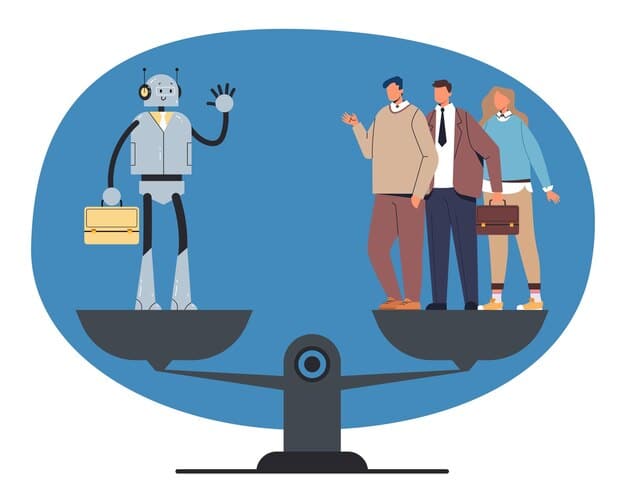Ethical AI Hiring: Understanding the Implications & Best Practices

The ethical implications of using AI in hiring processes range from bias and discrimination to transparency and data privacy concerns, requiring careful consideration and mitigation strategies to ensure fairness and compliance.
The rise of artificial intelligence (AI) has revolutionized numerous industries, and human resources is no exception. As companies increasingly adopt AI-driven tools for recruitment, it’s crucial to address what are the ethical implications of using AI in hiring processes to ensure fairness, transparency, and compliance.
Understanding the Role of AI in Hiring
AI is transforming how companies recruit and select candidates. These technologies offer the potential to streamline processes, reduce costs, and improve efficiency. However, the integration of AI in hiring also raises significant ethical questions that must be addressed proactively.
Benefits of AI in Recruitment
AI tools can automate repetitive tasks, such as screening resumes and scheduling interviews, freeing up HR professionals to focus on more strategic activities. These systems can also analyze vast amounts of data to identify patterns and predict the success of potential hires.
- Efficiency: AI algorithms can process applications much faster than humans, reducing the time it takes to fill open positions.
- Cost Reduction: Automating tasks can lower administrative costs and improve resource allocation.
- Data-Driven Decisions: AI can analyze candidate data to identify the best fit for a role based on objective criteria.
Despite these advantages, it’s crucial to recognize the potential pitfalls of relying solely on AI in hiring processes. Unchecked, these systems can perpetuate existing biases and create new forms of discrimination.

Bias and Discrimination in AI Hiring
One of the primary ethical concerns surrounding AI in hiring is the potential for bias and discrimination. AI algorithms learn from data, and if that data reflects historical biases, the AI system will likely perpetuate those biases in its decision-making processes.
Sources of Bias in AI Algorithms
Bias can creep into AI systems at various stages, from data collection and training to algorithm design and implementation. It’s essential to understand these sources to mitigate their impact effectively.
- Data Bias: Historical data may reflect societal biases related to gender, race, or socioeconomic status.
- Algorithm Bias: The algorithms themselves may be designed in ways that inadvertently favor certain groups over others.
- Implementation Bias: How AI tools are used in practice can also introduce bias, even if the underlying technology is neutral.
To address these issues, companies must carefully audit their AI systems and data sets to identify and correct any biases. Regular monitoring and evaluation are crucial to ensure ongoing fairness.
Transparency and Explainability
Transparency is another critical ethical consideration in AI hiring. Candidates have a right to understand how AI systems are used to evaluate them and make decisions about their employment prospects. Explainability, or the ability to understand why an AI system made a particular decision, is also essential.
The Importance of Explainable AI (XAI)
Explainable AI (XAI) refers to AI systems that can provide clear and understandable explanations for their decisions. In the context of hiring, this means that candidates should be able to understand why they were not selected for a particular role.
- Building Trust: Transparency and explainability help build trust between candidates and employers.
- Ensuring Accountability: When AI decisions are transparent, it’s easier to hold companies accountable for unfair or discriminatory practices.
- Improving Fairness: Understanding how AI systems make decisions can help identify and correct biases.
Companies should strive to use AI systems that provide explanations for their decisions and be transparent about how these systems are being used in the hiring process.

Data Privacy and Security
AI systems often require access to large amounts of personal data, raising significant data privacy and security concerns. Candidates may be required to provide sensitive information, such as their educational history, work experience, and demographic data.
Protecting Candidate Data
Companies must take steps to protect candidate data from unauthorized access, use, or disclosure. This includes implementing robust security measures and complying with relevant data protection laws, such as the General Data Protection Regulation (GDPR) and the California Consumer Privacy Act (CCPA).
Ensuring data privacy and security is not only an ethical imperative but also a legal requirement. Failure to protect candidate data can result in significant fines and reputational damage.
Companies should also be transparent about how they collect, use, and store candidate data. Candidates should have the right to access, correct, and delete their personal information.
The Human Element in AI Hiring
While AI can automate many aspects of the hiring process, it’s essential to retain the human element. AI should be used as a tool to augment human decision-making, not replace it entirely. Human oversight is crucial to ensure fairness and prevent unintended consequences.
Balancing AI and Human Judgment
Relying solely on AI can lead to a dehumanized hiring process, where candidates feel like they are being judged by machines rather than humans. This can damage a company’s reputation and deter talented individuals from applying.
Companies should strive to strike a balance between AI and human judgment. AI can be used to screen candidates and identify potential matches, but human recruiters should be involved in the final decision-making process.
Human recruiters can assess candidates’ soft skills, cultural fit, and other intangible qualities that AI systems may overlook. They can also provide personalized feedback to candidates, improving the overall hiring experience.
Legal and Regulatory Compliance
The use of AI in hiring is subject to various legal and regulatory requirements. Companies must ensure that their AI systems comply with anti-discrimination laws, data protection laws, and other relevant regulations.
Failure to comply with these laws can result in legal action, fines, and reputational damage. It’s essential to stay informed about the evolving legal landscape and adapt AI hiring practices accordingly.
Staying Informed and Compliant
Companies should consult with legal experts to ensure that their AI systems comply with all applicable laws and regulations. They should also regularly audit their AI systems to identify and correct any compliance issues.
Transparency is key to demonstrating compliance. Companies should be transparent about how they use AI in hiring and provide candidates with information about their rights.
By prioritizing legal and regulatory compliance, companies can minimize the risks associated with AI hiring and ensure that their practices are fair and equitable.
Best Practices for Ethical AI Hiring
Implementing ethical AI hiring practices requires a comprehensive approach that addresses bias, transparency, data privacy, and legal compliance. Companies should adopt the following best practices to ensure fairness and equity.
Key Steps for Ethical AI Implementation
- Data Audits: Regularly audit data sets to identify and correct any biases.
- Algorithm Evaluation: Evaluate AI algorithms for potential sources of bias and discrimination.
- Transparency: Be transparent about how AI is used in the hiring process.
- Explainability: Use AI systems that provide explanations for their decisions.
- Data Protection: Implement robust security measures to protect candidate data.
- Human Oversight: Retain human oversight in the final decision-making process.
- Legal Compliance: Ensure compliance with all applicable laws and regulations.
By following these best practices, companies can harness the power of AI to improve their hiring processes while upholding ethical standards and promoting fairness.
| Key Aspect | Brief Description |
|---|---|
| 🤖 Bias Detection | Regularly audit data and algorithms for bias to ensure fair hiring practices. |
| 🔒 Data Privacy | Protect candidate data with robust security measures and comply with data protection laws. |
| 🤝 Human Oversight | Maintain human involvement in final hiring decisions to balance with AI insights. |
| ⚖️ Compliance | Ensure all AI practices comply with anti-discrimination and data protection laws. |
FAQ Section
▼
AI hiring involves using artificial intelligence tools to automate and optimize various aspects of the recruitment process, such as screening resumes, scheduling interviews, and assessing candidates.
▼
Ethics is crucial to ensure AI hiring practices are fair, transparent, and non-discriminatory. Without ethical considerations, AI systems can perpetuate biases and create unfair outcomes for candidates.
▼
Bias can be avoided by regularly auditing data sets, evaluating algorithms for bias, and involving human oversight in the final decision-making process to ensure fairness and accuracy.
▼
Data privacy measures should include implementing robust security protocols, complying with data protection laws like GDPR/CCPA, and being transparent about how candidate data is collected, used, and stored.
▼
Legal compliance ensures all AI practices adhere to anti-discrimination laws, data protection regulations, and other relevant legislation, minimizing legal risks and maintaining ethical standards in hiring.
Conclusion
In conclusion, addressing the ethical implications of AI in hiring processes is paramount for creating fair, transparent, and equitable workplaces. By prioritizing data privacy, human oversight, and legal compliance, companies can harness the benefits of AI while mitigating potential risks and ensuring positive outcomes for all candidates.





